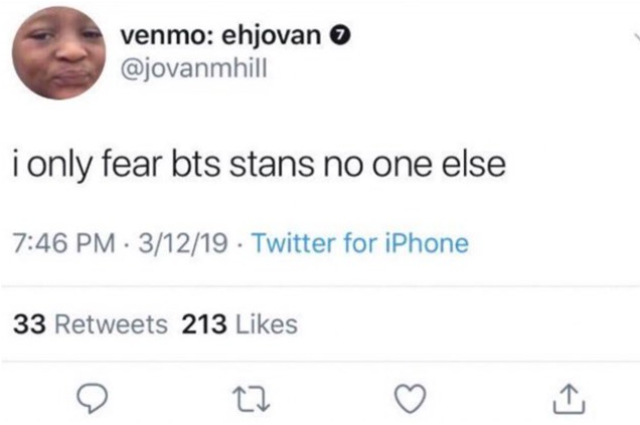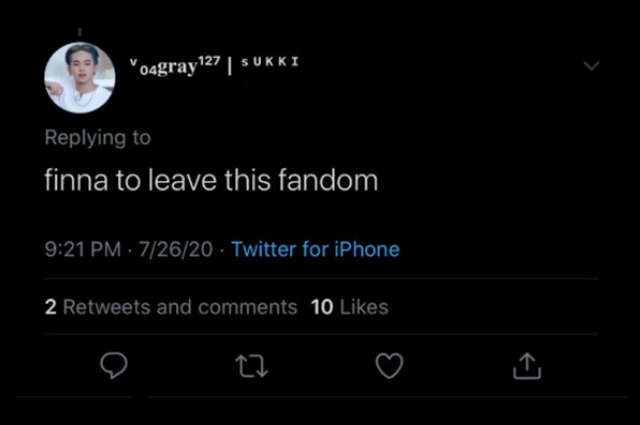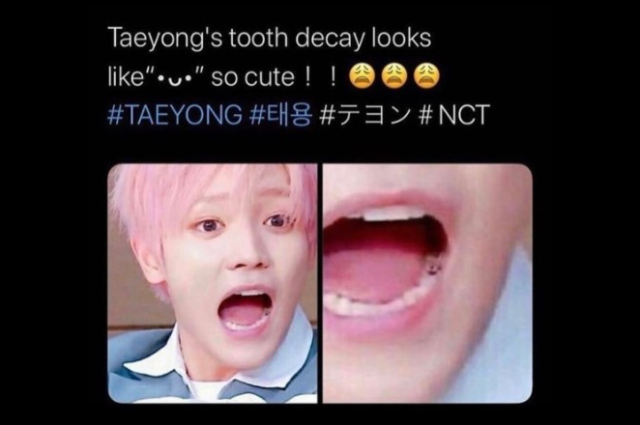
Social media has birthed innumerous pop culture trends. Ranging from memes to trending songs to fandoms, if there is a spark present that promises potential content, the public makes sure it catches on fire. One of these insanely volatile movements birthed out of the ever-increasing popularity of social media is the rise of Stan Culture.
Stan Twitter is a community of users that post content and share opinions influenced by their favourite celebrities, movies, TV shows, anime, artists and just about anything else influential. But to clearly understand the hyperreality created by stan twitter between individuals and their idolised celebrities, especially amidst a global pandemic where more and more users were joining online spaces to pass time and be involved in a community that feels like home, it is important to know what exactly the term 'stan' means, what are its origin and why people are so eagerly enthusiastic to be called one.
WHERE DID IT ALL BEGIN?
The word 'stan' according to textbook definition means an excessively enthusiastic and overzealous, oftentimes obsessive, fan of a particular celebrity.
The term originated from an Eminem song of the same name from the Marshall Mathers LP album released all the way back in 2000. It details the story of a man who called himself a 'stan' writing fan mail to Slim Shady, Eminem's alter ego. The lyrics of the song take you through the journey of how an intensely enthusiastic fan turned into an obsessed stalker and how his feeling for Slim changed from admiration:
To mildly offended:
I ain't mad,
I just think it's fucked up you don't answer fans.
I'll be the biggest fan you'll ever lose
Sincerely yours, Stan.
To personally feeling attacked because the singer won't answer his letters:
Dear Mister "I'm Too Good To Call Or Write My Fans",
This will be the last package I ever send your ass.
It's been six months and still no word, I don't deserve it?
I love you Slim, we coulda been together, think about it,
You ruined it now, I hope you can't sleep and you dream about it,
And when you dream I hope you can't sleep and you scream about it,
I hope your conscience eats at you and you can't breathe without me.
A fandom generated theory says the word 'stan' is an amalgamation of the words 'stalker' + 'fan'. But of course this is an extreme account of a rare occurrence and just like with many different terms related to pop culture, the meaning of stan has evolved into a more tone-downed form of it's previous definition through usage, now worn by dedicated fans like a shining badge of honour and adopted by various social media sites as a catchphrase for fans of all types of media and celebrities.
WHAT IS STAN TWITTER?
Stan Twitter is a collective of internet stans consisting of all different types of fandoms and covering every single niche under them.
Fandom culture has been prevalent long before Eminem released a song about it or social media sites came into use. So, why does stan twitter stand out from other communities? Besides it being subjective to every individual, the idea behind it can be narrowed down to 2 points:
1. ANONYMITY:
A common rule of thumb followed by users of stan Twitter is that most of them don't release any personal information on the platform that can be tied back to their real identity. Their display names, usernames, descriptions are all made up by relation to the celebrity their stan. In fact, their profile pictures are often also an icon of their idol. This kind of secrecy gives them the power to make up a personality of their own choosing, to almost live an alternate life that can be created and erased at the click of a button according to the user's convenience. In this age of censorship and internet-centred identities, online anonymity that allows one to express strong opinions with practically no consequence is a lifeline.
2. BELONGING:
We, as humans, need other humans to support and interact with us to keep going. Stan culture not only allows that to happen, but it lets you access people of your own choosing. Do you know how many people I know in my small town that enjoy the same anime as me and think of it just as highly as I do? Zero. Do you know how many of them I found on Twitter? Uncountable. There is an unparalleled high of finding a community where you feel at home, and all the benefits in the form of content related to your fandom that you receive at finally coming home. Of course, the term toxic wouldn't be synonymous with stanning, if any of us could recognize when obsession turns into an addiction.
THE GOOD, THE BAD AND THE UGLY
Like every trip before the car crashes, it starts out good. Participating in activities that will make you feel like you're walking hand in hand with a group of friends; never alone, never lonely. It Includes actively streaming newly released content and purchasing new songs, regularly posting about and promoting the art of your favourite artist, joining clubs and forums to participate in fandom generated activities, creating and popularising various trends centred around your idol through fancams, hashtags, memes, art, and uncountable tweets and similar activities. But that is just surface level observations from an outsider perspective. Take it from me, a person who has been an active member of stan twitter on various different fandoms, it goes much deeper than that.
Stans have an exhaustive impact on the global internet culture. It presents in various forms including but not limited to:
Slangs and Lingo:
The "trendy" phrases of internet culture termed 'twitter slang' as a by-product of stan culture isn't twitter slang at all. Like everything on stan twitter, most people don't bother understanding the meaning or the cultural significance of those terms. Because if they did, they would know it's not stan twitter language at all, but are all rooted in AAVE (African American Ventricular English) which is an established and recognised linguistic system and a dialect of English spoken natively by black communities.

Fancams:
Originally, these used to be videos focusing on a single member of a k-pop band, usually while the group is performing. With time, every video edit made by fans and shared on twitter came to be known as fancams. By definition alone, the idea of fancams seems harmless. And it was! until the hunger for more views on a user's fancam took over the initial purpose of them and fans began spamming them under completely unrelated tweets, oftentimes ignoring what the original post was about, creating situations where this intensive spamming became insensitive, harmful and generally annoying.
Stan Wars:
Fandoms have always clashed with each other, people trying to prove the media they like is the better one. An ancient example of this would be middle schoolers being divided into two broad categories of either Harry Potter fans or Percy Jackson fans. Stan twitter has taken this bit of harmless fun to a level the internet had never witnessed before. For instance,
- Barbz (Nicki Minaj's fanbase) vs Bardi Gang (Cardi B's fanbase)
- Swifties (Taylor Swift's fanbase) vs Beliebers (Justin Bieber's fanbase)
- ARMY (global sensation BTS' fanbase) vs Blinks (Blackpink's fanbase)
Infact, the discussion between Cassie apologists and Maddy defenders, characters from the TV show Euphoria, is a prime time example of stan twitter users taking issues unrelated to them and making them deeply personal.
Which brings me to my next point, the interactive ability of stan twitter that allows people to access celebrities at any date and time and gives fans an opportunity to interact with them creates a fallacy that the distance between an artist and their audience is always shortening, when in reality, it is only being used to boost engagement. This is not to say a lot of celebrities don't genuinely appreciate their fans, it is to say that the behaviour creates an illusion where normal individuals sitting behind their screens start to believe that the more they consume this content and the earlier they start to stan celebrities, the more personally they know them. Which, undoubtedly, is a false sentiment.
This creates a sort-of domino effect, making these influencers turn into 'idols' in the word's literal sense. Stan communities put these influencers on a pedestal and then act surprised when they start being seen as inhuman.
Inhuman in the way above-human where a good chunk of fans treat the word of their idols as the definite truth of gospel where they can do no wrong and say no wrong, and if they do then the most horrid actions become justifiable, to a point where anybody saying otherwise is cyber bullied and mass threatened until they either evacuate their platform or is falsely reported in a bulk so the twitter algorithm automatically suspends them. Well, although stan twitter will have you thinking otherwise, critical consumption of any art form doesn't negate it's enjoyment.
And inhuman, in the way below-human, because when these statues fall from their pedestals and the other side of the coin, the chunk of fans that see their faults and mistakes and call them out on it, feel like they almost have a right to be more disappointed in them because they were a part of the idol's fandom, and somehow that earns them a personal linkage to the artist.
For a lot of people, stan twitter and fandom culture is often used as some sort of coping mechanism. To have a break from real life problems and create this fantasy-esque life meant purely for entertainment and amusement.
It can go a few ways:
One, where people start viewing mundane actions performed by their favourites through a forced poetic lens, writing a ten-tweet thread based on a three second clip of their idol smiling. Or, two, where people start struggling with their own identity after mixing with a crowd talking about the same thing for an extended period of time, deluding people in boasting about their fav's records and achievements like it's their own. (A possible reason as to why a lot of mainstream music fandoms turn to mass buying albums and mass streaming songs on online platforms to have their fav break records as quick as possible and chart as high as possible so they can use those stats in consequent stan wars.)
Like I previously mentioned, here is once again where the domino effect comes into action. The more you get engaged in the numbers game, at some point, the need for belonging in a community turns into the need for validation from them. The medium and the fandom remains the same, but the objective goes from having a sense of familiarity with other people who share the same interests as you to the desire for more likes, more views, more followers. Which, in turn, blurs the lines of sensitivity, seeing every issue as just another chance to get a 'hit tweet'.
Regardless of all the things mentioned, the most complicated part of stan twitter is that the majority of people on the platform realise all these things. They realise that every community will have bad apples, and the larger the fandom, the bigger their toxic side. They also realise curating your feeds and timelines is a huge part of how you experience the community. And despite that, people stay. They make their accounts private, or stay with the same bunch of friends, but the need for constant entertainment through user-generated discourses and the need for constant gratification from like-minded people seems inescapable after investing so much of your energy into these accounts that are basically designed to be their alternate reality.
Extreme devotional fandom experience is an inescapable part of the teenage experience, it isn't inherently a positive or negative thing by itself. But when the cons overtake the pros, when obsessive behaviour, targeted harassment, the need to always maintain a superior moral ground, aggression and being blindsided to any personal or idol's wrongdoings overtake the 'enjoyment' factor, when unhealthy is the first word that comes to mind when describing the stan community, is it too late to inform people to get out of the stan mentality as early as possible? Or is it too early to say it is too late?


